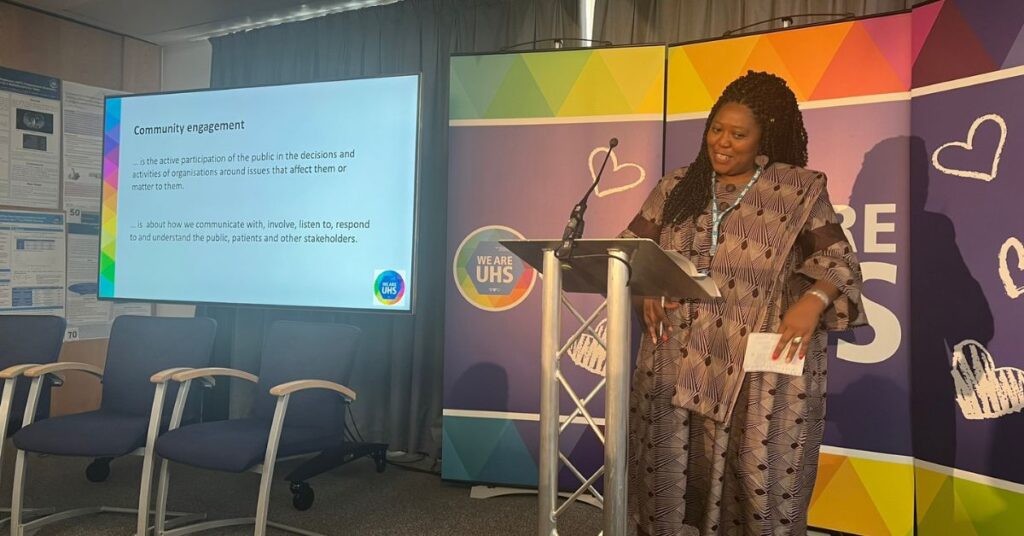What usually happens in Healthcare Conferences
Whether you are an NHS Trust, an ICB, an Academic Health Science Centre, or a Health Innovation Network, healthcare conferences typically bring together a diverse range of stakeholders, including clinicians, researchers, policymakers, industry experts, and occasionally patients. These events often feature a mix of keynote presentations, panel discussions, workshops, poster sessions, and networking opportunities. Topics covered in healthcare conferences vary widely, ranging from clinical research and medical education to healthcare policy and public health initiatives.
One of the primary objectives of healthcare conferences is to disseminate knowledge and best practices, foster collaboration, and drive innovation within the industry. Attendees have the opportunity to learn from leading experts, share their own insights and experiences, and forge valuable connections with peers and colleagues. Additionally, healthcare conferences serve as platforms for showcasing the latest advancements in medical technology, pharmaceuticals, and healthcare services.
Classic problems with Healthcare Events in the UK
Despite their importance, healthcare conferences in the UK often face a range of challenges that can impact their effectiveness and success. Common problems include:
- Lack of Engagement: Some healthcare conferences struggle to engage attendees effectively, leading to low participation and limited interaction among participants. This can result in a missed opportunity to exchange ideas, collaborate on projects, and drive meaningful change within the industry. One of the key factors here is running events in a similar manner repeatedly, meaning attendees know what to expect and any level of excitement or creative stimulation is very low. As a result, attendees don’t come with energy and enthusiasm or a desire to be challenged and inspired.
- Limited Accessibility: Accessibility issues, such as high registration fees, remote locations, clashes with clinical practice times and lack of virtual attendance options, can prevent healthcare professionals from attending conferences, particularly those from underrepresented groups or regions with limited resources.
- Content Overload: With a vast array of topics and sessions to choose from, attendees may feel overwhelmed by the sheer volume of information presented at healthcare conferences. This can lead to difficulty in prioritising sessions, missing out on key presentations, and feeling mentally exhausted by the end of the event.
- Over Reliance on Serendipity to Enable Networking to Occur: Not everyone is an extrovert who relishes the chance to approach people in a large room of strangers. Many people will simply revert to checking their emails on their phone and grab the opportunity to speak to someone they already know, if they happen to see them.
Solutions to make events in Healthcare more engaging
To address these challenges and make healthcare conferences more engaging and impactful, event organisers and healthcare organisations can implement several strategies:
- Introduce creativity: Enable new shared experiences in the build-up to and during the event itself – warm up your audience via videos and social media messages before the event and then deliver some pleasant surprises, inspirational experiences and moments of joy. You want your attendees to leave feeling good!
- Interactive Sessions: Incorporate interactive elements such as live polling, Q&A sessions, and small group discussions to encourage active participation and engagement among attendees. Move your audience from passive consumers to creators.
- Crowdsource ideas and frustrations / pain points from your attendees: Gather this information IN ADVANCE and use it to shape your sessions, topics and activities to meet you audience’s real needs.
- Diverse Perspectives: Ensure that conference programming reflects the diversity of the healthcare workforce and patient populations, with speakers and presenters from a variety of backgrounds and disciplines.
- Virtual Components: Offer virtual attendance options and live-streaming capabilities to make conferences more accessible to remote participants and those unable to travel.
- Structure in intentional networking approaches and systems: Often using technology or staff teams to enable connection, this requires a careful planning approach, to make things easy to take part in and palatable to the audience. The power of this can be transformational – attendees become advocates for your event, because it made them feel connected. They are also likely to come back to your next event with enthusiasm.
- Clearly articulate value and relevance: Be explicit in your messaging and agenda who each segment of the day is for and what value attendees will get. List job roles and specialisms. By chunking your programme into key segments, you will also make any time commitment more realistic for attendees who are likely to be struggling to secure the time to join the event.
- Make it easy to justify attendance: Provide potential attendees with all the information they need to secure the time they need to be at your event, especially if there is a ticket price. Consider providing a customised template that generates the information they need to cut, paste and email to their boss to get sign-off.
Key considerations for working with an Event Agency if you're a health organisation
Partnering with an experienced event agency can be instrumental in planning, managing, and delivering successful healthcare conferences. When choosing an event agency, health organisations should consider the following key factors:
- Industry Expertise: Look for an event agency with a proven track record of organising healthcare events and a deep understanding of the unique needs and challenges of the healthcare industry. From working with purchase orders and NHS finance systems, to understanding the comms challenges within a stretched workforce.
- Customised Solutions: Seek an event agency that can tailor its services to meet the specific goals, objectives, and budget of your organisation, whether you’re hosting a small-scale workshop or a large-scale international conference.
- Innovation and Creativity: Choose an event agency that embraces innovation and creativity, offering fresh ideas and innovative approaches to enhance the attendee experience and maximise the impact of your event.
- Joined-up Comms Thinking: Work with an event agency who understand the opportunity to generate large amounts of content from your events that can be fed into your year-around comms activities. From short form video clips, to on-site podcast recordings, photographs to insight gathering.
- Willingness to Challenge: As much a consideration for you and your organisation as for the event agency – being open to challenge can get you to improved event experiences quicker. Doing what you’ve always done will always get the same results, so moving beyond logistics and repeating what you’ve done before, how can you create space to invite new strategic thinking and event wisdom? This is where the magic✨ happens!
Autumn Live - specialists in these kinds of events
Take a look at some of our recent work for King’s Health Partner’s and Merck or see this recent testimony from Ceri Connor:

Healthcare conferences in the UK play a vital role in driving innovation, collaboration, and knowledge exchange, but they also contain a vital opportunity to boost staff wellbeing. Making attendees feel part of a healthcare community is a huge win at a time when many are feeling exhausted. As ever, people will remember how you made them feel much more than what they heard at your event. By addressing common challenges, implementing innovative strategies, and partnering with experienced event agencies, health organisations can ensure the success of their conferences and make a meaningful impact on the future of healthcare.


